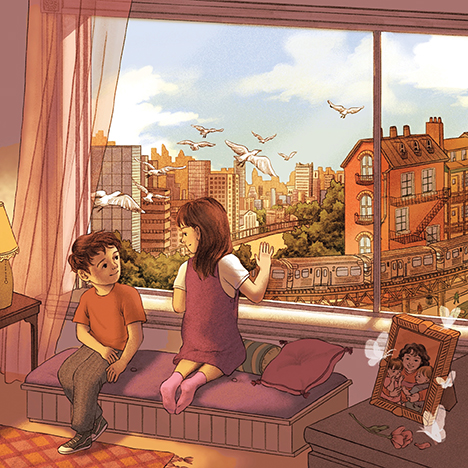His story
Twenty years after his mother’s death on September 11, Michael Trerotola ’21 shares his place in history.

Twenty years after his mother’s death on September 11, Michael Trerotola ’21 shares his place in history.
Thirty-six-year-old Port Authority worker Lisa Trerotola lost her life in the September 11 attacks on the World Trade Center, leaving behind her husband and twin toddlers. For her son, Michael, who graduated from TCNJ in December 2021, the 20th anniversary changed how he sees his family, and how he remembers his mom.
In a sense, the 20th anniversary of September 11th was typical for me, in that I didn’t really do much. I know other families and friends of people who died in the attacks tend to go to the memorial in New York City or to local commemorative events.
For me though, on that day, I need to take time to myself, and also, I need to be around people. I read the news stories about the survivors, and about the victims, but I can’t get bogged down in that — I’ll just get too upset. So, I spend time with people too.
But this year was different from any other year in that I had this sense of pride that I’ve never really felt before. I think that’s because I was able to talk about it with my family more openly than in the past.
I grew up thinking my mom had died in a fire. My dad never really told my twin sister and me what happened the day she died, but I saw fire on the news. We never questioned it.
I thought my childhood was pretty normal until I started to compare notes with other kids. My sister and I weren’t allowed to go on trains, buses, airplanes — especially not airplanes. We couldn’t go into big cities. We couldn’t have sleepovers. We were isolated in a lot of ways. As I came of age, there was this resentment. I wished I could be like other kids. I wanted to do things that other people did.
The first moment we ever discussed what really happened, I believe I was 10 years old. My dad and stepmom sat us down on the bed and said, “Do you remember your mom?” Then they asked us some questions about her, I remember, and they explained that she died in the 9/11 attack.
I was in complete shock. It was all so confusing, and kind of soul-crushing: This perception I had of my mom — that she died in a fire and we didn’t really talk about it — all of a sudden, that was true, but I only knew part of the truth. Not only was this upsetting, earth shattering, and sad, there was also a sense of secrecy. I felt like I was kept from something. I felt lied to. I felt the world was lying to me.
I asked more questions, and my dad started talking about terrorism. I didn’t understand: I didn’t know the political ramifications, what terrorism meant, why terrorists would do that. In fact, I wouldn’t ever really understand until I got to college.
My dad never talked about the events of 9/11, and never wanted us to talk about them, either. I felt like I had to hide this thing that happened to my family, not for my sake, but for his. I know some people, especially children of the victims of 9/11, who were really interested in questions like: What compels terrorists to do something? How can we prevent something like this from happening in the future? I was not at that point. I wasn’t really interested in that way, at least not yet. I knew 9/11 was a bad thing, and I just kind of left it at that, if I’m being honest. I kept myself distanced from it.
The secrecy made me feel like an outsider. I still struggle with that, with finding my place in a group of friends, in a community. In the back of my head, I’m always telling myself: You don’t really belong. There’s something about you, that you’re not like other people. Although I’m getting better with that today.
Shortly before the 20th anniversary, NPR approached me and my sister for a story about families of victims. This is something my dad never would have agreed to. But for us, it felt like the right thing.
I even got to see videos of my mom — videos my sister found for the NPR reporter. Before that, I only had two memories of my mom, just quick flashes, but no memory of her voice. So hearing her speak for what felt like the first time in my life, was a really powerful moment.
I felt this freedom, like I could just be myself, be a part of this moment in history, and remember aspects of my mom that I never really got to see. I’m not sure how my dad truly felt about our interview, though he did say he liked that we “said what we needed to say.”
Truly, the 20th anniversary wasn’t melancholic for me. It felt encouraging, empowering. I wondered what my mom would have been like if she were alive, what she would have thought of me. I reflected about how she may have reacted to my coming out as gay and if she would have helped me embrace my identity. Obviously, I can’t have these questions answered, but this year, for the first time, I had space to ask them. In future years, the 9/11 anniversary isn’t going to be about silence or distance anymore. It’ll be different from now on.
Illustration: Sarah Jung
Posted on February 7, 2022

